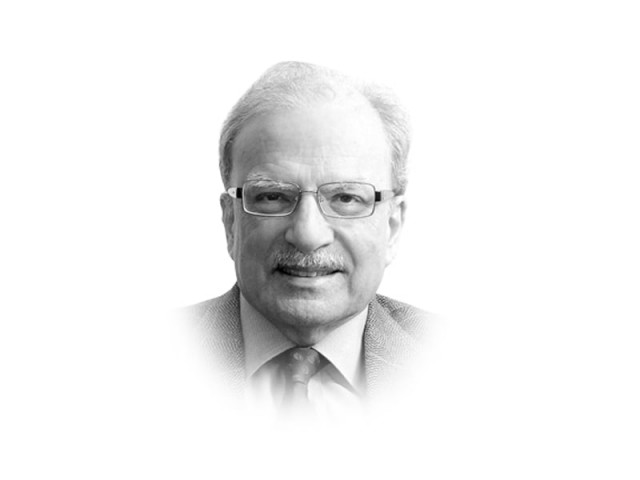Pakistan’s relations with its neighbours: Afghanistan
Kabul & Islamabad must recognise that growing rivalry between Beijing &Washington has given rise to a new ‘great game’

The writer is a former caretaker finance minister and served as vice-president at the World Bank
Much has been written and talked about Pakistan’s relations with the United States, China and India. The literature on Pakistan-Afghanistan relations is thin and it is practically non-existent on the subject of Pakistan-Iran relations. In the past few months, using The Express Tribune as the medium, I have tried to fill one of these gaps. In a series of articles in the last couple of months, I have made some suggestions aimed at developing a better understanding of our relations with Afghanistan. With the article today, I will suggest that in order to craft a more informed approach in the domain of external relations, it is not only necessary to have a sound understanding of how we should work with our four immediate neighbours but to develop a framework that includes all of them as well as those, such as the United States, Turkey, Saudi Arabia and the UAE, that are at some distance from us.
The Afghans and Pakistanis don’t fully recognise — at least, I believe their governments don’t — that they are at the centre of cataclysmic changes that are occurring all around them. Unless they do that, they will be focused much more on how they should relate with one another and not enough on how they should work together in this fast-changing world. They need to protect themselves and also take advantage of the transforming global economic and political systems. Today, I will begin with an examination of how the changing circumstances of the United States and China will influence the world of which Afghanistan and Pakistan are two important parts.
It is now accepted in most policy circles that the United States is no longer in possession of the monopoly of power it had for almost two decades. From 1991, when the Soviet Union collapsed, to 2007, when the world plunged into what has come to be called the Great Recession, America reigned supreme over the world. And then its situation began to change not, I would maintain, for economic reasons but because of the way the political system has worked in the country. The United States may have surrendered its position to China as the largest world economy, but it has not lost any of its inherent economic strength and dynamism. According to the IMF and based on the purchasing power parity methodology, China became the world’s largest economy sometime in the last quarter of 2014. But when viewed from different angles — measuring economic size on the basis of market exchange rates, or the capacity to innovate, or to develop new types of corporate structures — the United States remains the global leader. However, it is pulling back from the global scene, including from the area to which Pakistan and Afghanistan belong, for political reasons. There is no longer a political consensus in the country it had for more than half a century that it could and should lead the world. From the end of the Second World War in 1945 to the beginning of the Great Recession of 2007-09, Washington had no problem projecting itself on the global scene. It is finding it difficult to do that because of the way the political system is now working in the country.
The other major global change is the rise of China. China now, compared to 1979 when it began reforming its economy, not only has a large and vibrant economy, it also knows where it wants to go and has the political will supported by a political system to get there. There are two extremely important objectives China is now pursuing. The first is the maintenance of a reasonable rate of economic growth which it sees as six to seven times the rate of increase in population. For that to happen, it must trade and have access to the raw materials it needs. For these it must look to its west and that is where the much-discussed China-Pakistan Economic Corridor comes into the picture. The second objective is to keep foreign influence at some distance from its borders. This is the reason why it is taking some extraordinary steps to increase the quality of its presence in the East and South China Seas.
It is in the context of changes in these two large economic and political powers that policymakers in Islamabad and Kabul must view their own economic and political futures. Both Kabul and Islamabad must recognise that the growing rivalry between Beijing and Washington has given rise to a new ‘great game’ that will be played out in several parts of the world. In two of these parts, Afghanistan and Pakistan occupy an important place.
Published in The Express Tribune, May 18th, 2015.
Like Opinion & Editorial on Facebook, follow @ETOpEd on Twitter to receive all updates on all our daily pieces.












1724319076-0/Untitled-design-(5)1724319076-0-208x130.webp)


COMMENTS
Comments are moderated and generally will be posted if they are on-topic and not abusive.
For more information, please see our Comments FAQ